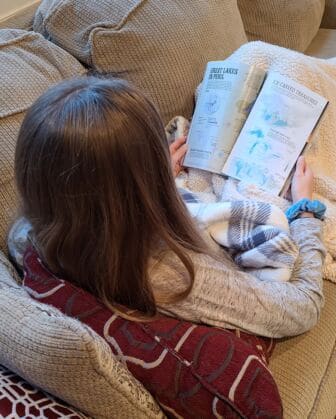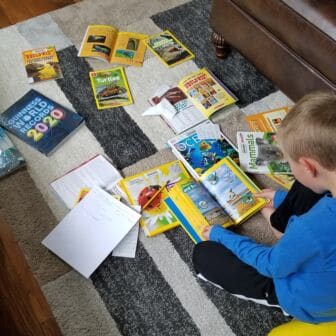
A Teacher’s Take on Computerized Reading Tests
By Stefanie Rysdahl Fuhr, guest blogger
If we expect the students in front of us to look to reading for pleasure and solace in their adult lives, we need to give them the gift of reading today. We need to create beautiful reading rooms with calm, uninterrupted reading hours. Above all we need to fill our bookcases with the best books available. I wouldn’t have attempted to read if my bedside didn’t boast the best novelists, journalists, historians, and poets. When we have the best books, and use them in thoughtful and well-informed ways…reading will inspire [children] to pause and think deeply about their own lives and the lives of others. –Shelley Harwayne, in Writing through Childhood
 As an experienced teacher who got to teach before No Child Left Behind, I was allowed to teach children to read in authentic and child centered ways. Therefore, I am not a fan of computerized reading programs or computerized reading tests. Both are great for the data driven era but are not great for assessing or teaching our children how to read. Because of what I know, I refuse reading programs and assessments for my own children.
As an experienced teacher who got to teach before No Child Left Behind, I was allowed to teach children to read in authentic and child centered ways. Therefore, I am not a fan of computerized reading programs or computerized reading tests. Both are great for the data driven era but are not great for assessing or teaching our children how to read. Because of what I know, I refuse reading programs and assessments for my own children.
Today’s business model had created a data driven environment where children as young as 5 take a computerized reading test to determine what supposed deficits they have in isolated skills that some believe will lead to reading acquisition. It doesn’t. Nor does it lead to lifelong learners or readers.
Reading in simplest terms is interaction with text. It is an understanding of the text, but more so how we take it much deeper through connections, questions, inferences and evaluating how those words inform and change how we interact with life. You get much more out of it by participating than sitting on the sideline or in the audience. Reading involves action. But computerized programs, like Accelerated Reader do not allow for kids to pause and think deeply. Instead it forces kids to sit on the sideline and watch.
Kids who are required to use computerized reading programs understand reading to be answering multiple-choice questions that someone else has deemed important. These simple recall questions are supposed to provide teachers with information about a reader’s understanding of the words on the page. There is no ownership in the reading process.
Kids also believe their reading ability can be summed up in a number. As I drove my daughter and her friends to the mall I listened to her peers share their reading scores from the MAPS test. They believed that score defined them as readers and they compared their scores to determine who the better reader was. Reading can never be reduced to a number or mastering a set of isolated skills. A multiple choice test can never determine what abilities a person brings to text. On top of that, many schools use that multiple choice test to force children to read books within a pseudo lexile range. Again no computerized test can determine a reading level as readers choose books based on interests and background knowledge. I cringe at the damage being done to readers.
As I think about the desired conversation I want to have with student readers, I think of adult readers. Do they read a book and then go to take a multiple-choice quiz? Or do they sit and drill each other for short simple answers? Do they first take a test to determine if they should read the book at all? NO! I’ve never experienced this as an adult reader. As adults we read a variety of text and talk about what sticks out to us, or more importantly what a text means to our own lives. Our children are better served if the system would scrap the computerized reading assessments and programs as they cannot ever create literate lifelong readers.
Shelley Harwayne writes:
I learned from Charles Frazier’s Cold Mountain what it was like to fight for survival during the Civil War… I learned from Virginia Hamilton Adair’s poetry collection, Ants on the Melon, to look at the world with new eyes and insights. I learned from Mitch Albom’s Tuesdays with Morrie, to be ever so grateful to have left the hospital and ready to appreciate each day awe.
Let’s get back to reading that will inspire readers to pause and think deeply about their own lives and the lives of others. Reading programs and tests will never create the readers we need to solve the problems a democratic society needs to address. Computerized programs can’t do this. The best way to create lifelong readers is to let kids interact deeply with text.
Our children are better served if the system would scrap the computerized reading assessments and programs as they cannot ever create literate lifelong readers.-Stefanie Rysdahl Fuhr


About the Author
